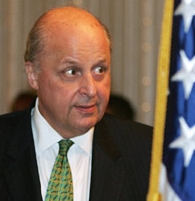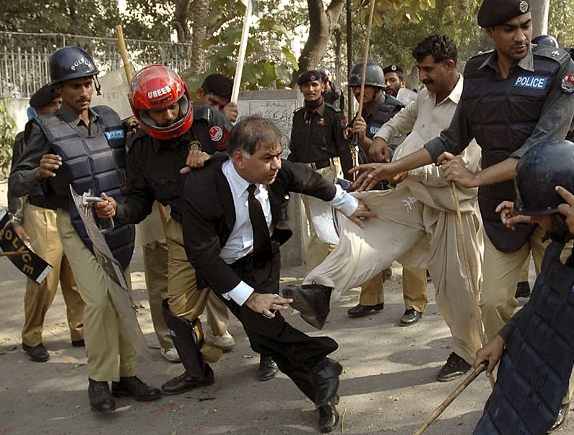Pakistanis growing frustrated with U.S.
By Emily Wax and Imtiaz Ali, Washington Post, November 16, 2007
Inside call centers and in high school social studies classes, at vegetable markets and in book bazaars, Pakistanis from different walks of life here say that ever since President Pervez Musharraf imposed emergency rule two weeks ago, he’s been the most unpopular figure in the country. But running a close second, many say, is his ally: President Bush.
“We used to love America. Give me Tom Cruise and a vacation in Florida any day,” said Parveen Aslam, 30, who like many Pakistanis has relatives in the United States. “But why isn’t the U.S. standing up for Pakistan when we need it most? Is America even listening to us? We are calling them Busharraf now. They are the same man.”
While many Pakistanis lament that the Bush administration is involved in their country’s politics, they also see the United States as the only force strong enough to do what they say is necessary to temper the crisis: pressure the military-led government to restore the constitution, release thousands of political prisoners and lift restrictions on the news media. [complete article]
Militants gain despite decree by Musharraf
By Jane Perlez and Ismail Khan, New York Times, November 16, 2007
Gen. Pervez Musharraf, the Pakistani president, says he instituted emergency rule for the extra powers it would give him to push back the militants who have carved out a mini-state in Pakistan’s tribal areas.
But in the last several days, the militants have extended their reach, capturing more territory in Pakistan’s settled areas and chasing away frightened policemen, local government officials said.
As inconspicuous as it might be in a nation of 160 million people, the takeover of the small Alpuri district headquarters this week was considered a particular embarrassment for General Musharraf. It showed how the militants could still thumb their noses at the Pakistani Army.
In fact, local officials and Western diplomats said, there is little evidence that the 12-day-old emergency decree has increased the government’s leverage in fighting the militants, or that General Musharraf has used the decree to take any extraordinary steps to combat them. [complete article]
Benazir vs. Musharraf is Punch vs. Judy
By Tony Karon, Rootless Cosmopolitan, November 13, 2007
Musharraf didn’t declare emergency rule because he feared Bhutto’s challenge; he declared emergency rule because the Supreme Court was about to rule that he was not, in fact, legitimately the president of Pakistan, because he violated the constitution by standing for the presidency while in command of the military. And the reason Bhutto appeared to hesitate when it happened was obvious: She has as much to fear from the independent judiciary in Pakistan as Musharraf does. The same judges threatening to strip Musharraf of the presidency had also warned that the amnesty extended by him to Bhutto — absolving her of numerous corruption charges — was also illegal. (And, for good measure, the same judges had also ruled that Nawaz Sharif’s expulsion was illegal.) The last thing Bhutto needs is the rule of law and an independent judiciary in Pakistan, for that would pull the rug out from her deal with Musharraf, put her back in court, and bring her fiercest political rival back into the picture at a moment when she is increasingly vulnerable, politically, by virtue of her alliance with the U.S.
House arrest, if anything, gives Benazir political cover for avoiding the streets. Better for Bhutto to sit out whatever turmoil will come in the weeks ahead, cultivating an image of martyrdom ahead of the elections that Musharraf promises for January (although a Musharraf promise and a dollar will buy you a cup of chai at Pak Punjab on Houston Street). Remember, Bhutto’s party may be the largest single party in Pakistan, but its ceiling is about 30% of the vote. If the Washington-brokered deal is to work, Musharraf, too, needs Bhutto’s popularity to be boosted.
Proxies always have independent agendas; if they didn’t, well, they wouldn’t be proxies. So, the U.S. struggles to get Musharraf to do its bidding — because he has a far keener sense of the requirements of his own survival in a dangerous part of the world, and also of Pakistan’s strategic interests, than do his U.S. interlocutors. And Musharraf struggles to control the Taliban in the same way. The Taliban, remember, was literally created by Pakistan’s Inter Service Intelligence in the early 1990s, as a proxy force to take charge in Afghanistan and end the chaos there by establishing a monopoly of force in the hands of a Pakistan ally. This was a continuation of the U.S.-Saudi-Pakistan policy in the 1980s of using Pakistan as a sanctuary from which to train and recruit jihadis to fight the Soviets in Afghanistan, and also of Pakistan’s pursuit of its own interest to counter the power in Afghanistan of warlords allied with its key regional rivals, India and Iran — i.e. the forces grouped in the Northern Alliance. [complete article]
Students hand Khan to police
By Saeed Shah, The Scotsman, November 15, 2007
Iran Khan, one of the last remaining independent political voices at liberty in Pakistan, was attacked by hardline Islamic students yesterday and handed over to police.
With the former prime minister Benazir Bhutto under house arrest and thousands of activists and lawyers in prison, the only political force left free in the country is the religious Right. General Pervez Musharraf’s regime has not moved concertedly against the mullahs, who have always been close to the army.
Mr Khan made his first public appearance yesterday since going into hiding when the emergency was declared on 3 November. Police had sealed off all entrances to Punjab University in Lahore, where he had announced that he would address students.
Somehow he made it through the cordon, appearing suddenly just after midday, where hundreds of students had gathered, chanting slogans against the regime. He was immediately hoisted on to people’s shoulders, raising his fist in the air, amid scenes of jubilation.
But events turned nasty very quickly as the “beards” – students belonging to the feared Islami Jamiat Talba – moved in. The crowd was pushed towards a nearby building. Mr Khan was bundled inside and the gates were locked. Some claimed that he was punched repeatedly. The entrance was guarded by Jamiat students. [complete article]
See also, Imran Khan’s kin, party workers arrested (Zee News) and Musharraf swears in caretaker government (AP).


